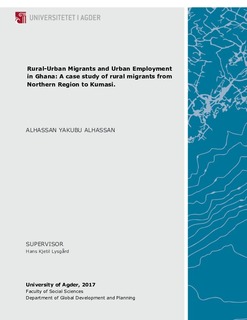| dc.description.abstract | Studies have shown that rural-urban migrants migrate to search for employment opportunities in urban areas. Despite the prominence of this factor, little is known of how rural-urban migrants jostle for employment in the cities. Using a case study research design and a qualitative research strategy, this study investigates how rural migrants in Ghana jostle for employment in the urban areas. Specifically, the study investigates the factors that influence migrants’ decision to migrate to urban areas, their job search strategies, the challenges they face and their coping strategies. Also, the use of the outcomes of their employment activities on their livelihoods are examined. Data were collected from 89 migrants and 16 opinion leaders in Aboabo, a suburb in Kumasi, Ghana, using interviews, focus group discussions and observations. The study draws from the Social Networks Theory and The Sustainable Livelihood Approach to conduct the study. The results show that the reasons for migration are mostly economic and are linked to unemployment, low incomes, lack of rural job opportunities, climate change and worsening living conditions in the rural areas. Migrants mostly engage in informal activities in the city because of their low levels of formal education. The findings reveal that despite being accused as the cause of increasing unemployment in urban Ghana, migrants jostle for employment by engaging in multiple income generating activities, creating their own jobs in the informal sector, employing each other and depending on friends and relatives and using their mobile phones for job-related information. In the process of engaging in their employment activities, they are vulnerable of being victimised, stigmatised, and criminalised and are challenged with physical injuries, indebtedness, and cheating from their customers. These challenges emanate from their relationship with the native residents, city authorities and law enforcement agencies and the migrant’s low level of educational attainment, youthful age structure and the nature of their jobs. The migrants cope with these challenges by seeking the help of friends and relatives and ethnic associations in addition to depending on their spiritual and religious belief systems. The migrants use the outcomes of their employment activities to improve their livelihoods through investing in agriculture, building houses, establishing businesses and educating their children. | nb_NO |

